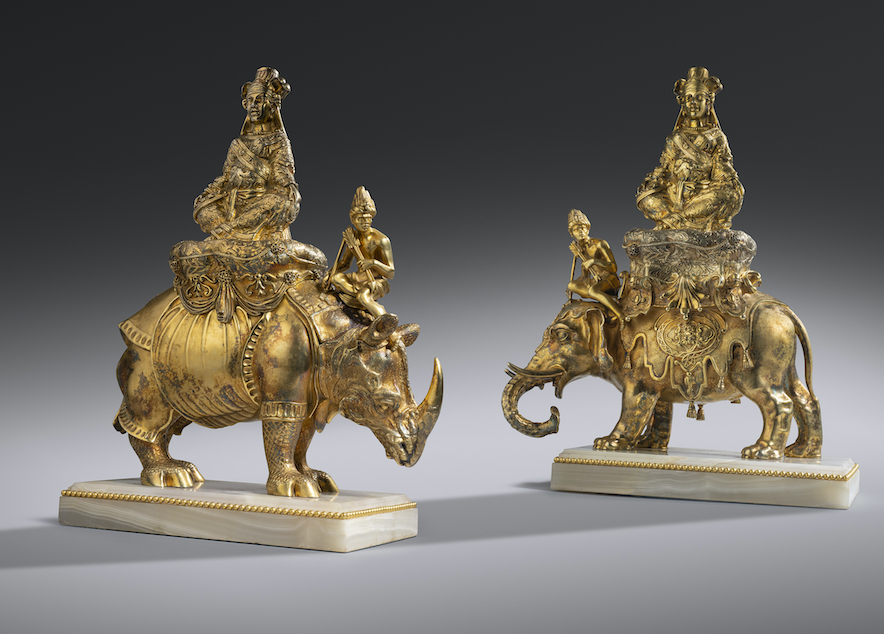Rothschild Exbury House consignment reaches zenith
The Rothschild consignment from Exbury House reaches its zenith on August 11, when auctioneers Woolley & Wallis will offer a selection of lots with combined expectations of up to £100,000.
The auction comes on top of well over £100,000 worth of items sold in two previous sales, with pictures from the collection valued at tens of thousands of pounds to come in the Old Master Paintings sale on September 8.
The entire consignment of pictures, works of art and furniture make up around 85 lots that have come to Woolley & Wallis thanks to a decision to rearrange parts of the interior at Exbury, a seat of the Rothschilds since 1919.
Highlights in the Furniture, Works of Art and Clocks auction on August 11 include a pair of Louis XVI ormolu and marble models of the Borghese vase, a celebrated krater sculpted in 1st century BC Athens that now resides in the Louvre. Together the pair is expected to fetch £20,000 to £30,000.
 A pair of 19th-century continental silver-gilt figures of a rhinoceros and elephant with Eastern riders and attendants, carry hopes of £10,000 to £15,000, and a set of eight giltwood and Aubusson tapestry fauteuils in Louis XVI style come with a guide of £8,000 to £12,000.
A pair of 19th-century continental silver-gilt figures of a rhinoceros and elephant with Eastern riders and attendants, carry hopes of £10,000 to £15,000, and a set of eight giltwood and Aubusson tapestry fauteuils in Louis XVI style come with a guide of £8,000 to £12,000.
Previously the estate of the historian William Mitford and then Lord Forster, a one-time Governor-General of Australia, by the time Lionel Nathan de Rothschild (1882-1942) acquired Exbury, the 18th-century house was all but derelict, and he had it remodelled in the late 1920s.
It was the gardens that were Lionel’s true passion, as their unique micro-climate at the south eastern edge of the New Forest in Hampshire rendered them particularly suitable for the planting of rare rhododendrons, camelias and azaleas from Asia. Here he created an inimitable garden, employing 250 men to clear out the woodland so that it could be laid out, while installing an intricate irrigation system involving 22 miles of underground piping.
If the garden was a triumph, the house was more unfortunate. Barely a decade after Lionel had refashioned it to his liking, war broke out. Just over two years later he died and four months after that the Admiralty requisitioned the house, giving the family no more than 48 hours to clear their possessions and themselves out.
 The legacy of its military occupation throughout the WWII meant that both house and gardens had to be restored once more, this time under the direction of Lionel’s son, Edmund (1916-2009), who opened the gardens to the public in 1955.
The legacy of its military occupation throughout the WWII meant that both house and gardens had to be restored once more, this time under the direction of Lionel’s son, Edmund (1916-2009), who opened the gardens to the public in 1955.
Edmund was also an art collector, but it is to another Rothschild that a number of the notable highlights consigned to Woolley & Wallis may be attributed. These heirlooms from Exbury entered the family via Alfred de Rothschild (1842-1918), a director of the Bank of England by the age of 26 and Lionel’s uncle. In 1879 on the death of his father, Alfred had inherited the 1,400-acre Halton estate in Buckinghamshire, where he promptly built a sumptuous house in the style of a French chateau, and it was from here that these choice lots emanate.
Woolley & Wallis’s former chairman Paul Viney, who remains an active part of the firm as a director, has been overseeing negotiations for the Exbury House consignment for the past three years. “For over 200 years the Rothschilds have been renowned as great collectors. The provenance of the lots we are selling, many of which have been through several generations of the family, can only enhance their interest,” he said.


